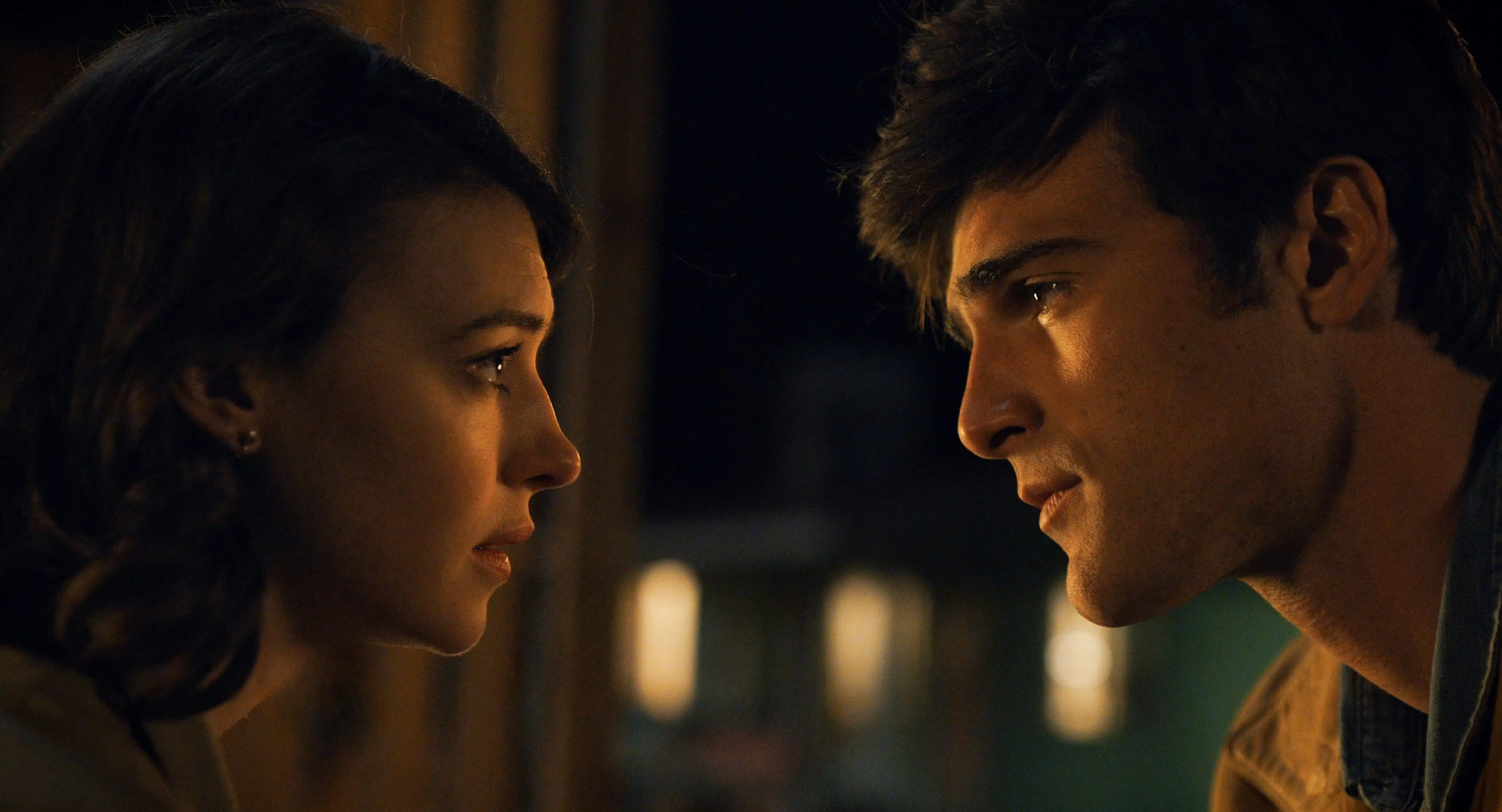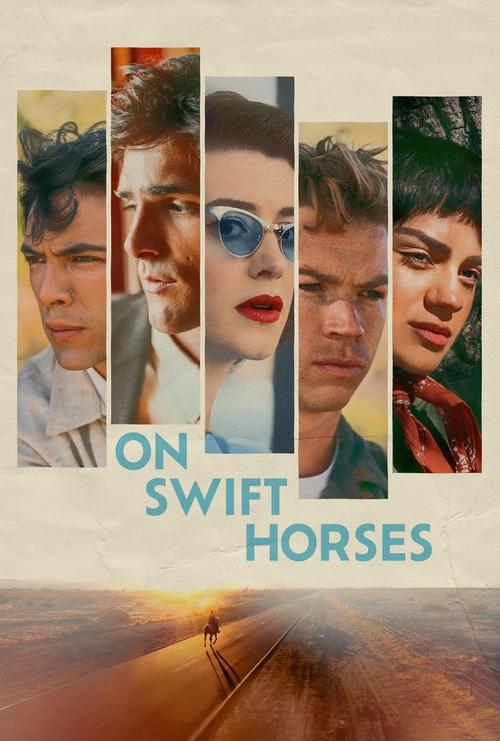On Swift Horses – Film Review
Published April 17, 2025

Daniel Minahan’s On Swift Horses is a meditative and quietly torrid romantic drama that leans heavily into longing, repression, and the crumbling illusions of post-war Americana. Adapted by Bryce Kass from Shannon Pufahl’s 2019 novel, the film is less about the concrete trajectory of its plot and more about the subtle, layered interiority of characters struggling to forge identities in a world that boxes them in. With a visually rich, at times lyrical style, and a heavy emphasis on subtext and mood, On Swift Horses is a tale of two forbidden love stories running in parallel—each shaped by secrets, shame, and fleeting freedom. The result is a mixed yet intriguing film that occasionally stumbles under its ambition, but lingers in the mind thanks to its performances and emotional weight.
Set in the 1950s, the story begins in the sun-drenched optimism of post-Korean War America. Muriel (Daisy Edgar-Jones) is trying to build a stable life in California with her husband Lee (Will Poulter), who has just returned from the frontlines. They settle into a modest routine, but it is clear from the outset that their union is more duty than passion. When Lee’s younger brother Julius (Jacob Elordi) enters the picture—a fellow war veteran, magnetic and volatile—the household’s fragile equilibrium begins to shift.
Julius is the film’s axis of disruption and discovery. Restless and enigmatic, he soon breaks away from Lee and Muriel, heading to Las Vegas in search of something unspeakable—freedom, danger, identity. There he meets Henry (Diego Calva), a soft-spoken and soulful casino worker. What begins as camaraderie develops into a romantic relationship marked by tenderness and tension. Julius and Henry move in together, but remain hidden in the shadows of a society that would never accept them. Their love is clandestine, cloaked in motel walls, low-light whispers, and lingering touches. Elordi, in his most emotionally daring performance to date, captures Julius’ quiet ache—his vulnerability tucked just beneath his brooding masculinity.
Meanwhile, back in San Diego, Muriel begins to shed her skin. While Lee clings to visions of the nuclear family and the American Dream, Muriel drifts further from him, drawn instead to gambling on racehorses and then to a deepening connection with her neighbor Sandra (Sasha Calle). Their relationship unfolds in hushed intimacy, delicately paralleled with Julius and Henry’s. Muriel’s journey, played with understated emotional complexity by Edgar-Jones, is the film’s strongest thread. Her descent into the racetrack world—full of grit, risk, and late-night luster—is less about financial escape and more about self-reclamation. When she and Sandra begin their romantic entanglement, it is rendered with restraint and reverence, highlighting how radical quiet acts of love can be in oppressive times.
Minahan’s direction emphasizes atmosphere over plot propulsion. On Swift Horses moves at a languid pace, often to its detriment. There are long stretches where narrative momentum stalls, relying instead on evocative visuals, poetic editing, and unspoken looks to carry emotional weight. While this lends the film a sensual, almost dreamlike quality, it also creates distance. Some moments that should hit with emotional power end up feeling muted. The script by Kass is introspective but occasionally too elliptical, favoring mood over clarity. As a result, certain character arcs, especially Lee’s, feel underdeveloped. Will Poulter does what he can with the material, playing Lee as a man holding the shattered pieces of traditional masculinity, but the script gives him little interiority beyond confusion and frustration.
Where the film does succeed is in its visuals and performances. Cinematographer Luc Montpellier bathes the film in golden light and rich shadow, crafting a mid-century America that feels both romantic and haunted. Las Vegas and San Diego are captured with equal intimacy, contrasting artificial glitter with suburban mundanity. The editing choices—a mix of lingering cuts and abrupt transitions—evoke memory and repression. Daniel Minahan smartly resists melodrama, allowing the performances to breathe.
Daisy Edgar-Jones anchors the film with remarkable restraint, embodying Muriel’s yearning with every slight movement, glance, or tremble in her voice. Her scenes with Calle’s Sandra are some of the most touching in the film, full of mutual discovery and unspoken hope. Edgar-Jones plays Muriel not as a victim or rebel, but as a woman simply trying to be, in a world that denies her agency.
Jacob Elordi continues to surprise with his range. Julius could easily have been a stereotype—troubled, brooding, reckless—but Elordi imbues him with depth and pathos. His chemistry with Diego Calva is nuanced and convincing, driven less by overt passion and more by a need to feel understood. Calva brings a quiet warmth to Henry, grounding Julius’ instability with calm devotion. The moments between them are tender, tense, and melancholic—never allowed to reach full expression, much like their lives.
One of the film’s strengths lies in how it draws thematic parallels between Muriel and Julius without overtly connecting their journeys. Both are outcasts, both are dreamers, and both are reaching for lives that feel just beyond their grasp. That mirroring adds emotional resonance, even when the script falters in pacing or cohesion.
However, On Swift Horses does fall short of greatness. Its refusal to pick up narrative steam, coupled with its sometimes overly opaque dialogue, will test viewers’ patience. The story builds but never crescendos. And while the dual narratives complement each other, they sometimes feel too loosely interwoven—like separate short stories stitched together without enough connective thread. The film asks for emotional investment, but doesn’t always reward it with catharsis.
Ultimately, On Swift Horses is a flawed yet evocative portrait of queer love and feminine longing in an era defined by conformity. It succeeds more as a tone poem than a tightly structured drama, and its emotional undercurrents are strongest when it lets its characters simply feel rather than explain. With a bit more narrative focus and urgency, it could have been a quietly devastating masterpiece. As it stands, it’s an impressionistic, well-acted, and beautifully shot work that earns a respectful 3 out of 5 stars.
It may not gallop to greatness, but On Swift Horses rides into emotionally potent territory with enough grace to make the journey worthwhile.
